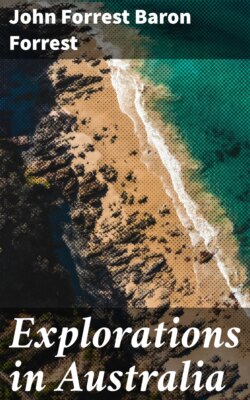Читать книгу Explorations in Australia - Baron John Forrest Forrest - Страница 37
На сайте Литреса книга снята с продажи.
THE NATIVES' STORIES.
ОглавлениеIn the first place, Mr. Frederick Roe was informed by the native Weilbarrin, that two white men and their native companions had been killed by the aborigines, thirteen days' journey to the northward, when he was at a spot called Koolanobbing, which is in south latitude about 30 degrees 53 minutes, and longitude about 119 degrees 14 minutes east. Mr. Austin lost eleven horses at Poison Rock (nine died, and two were left nearly dead), which is in latitude 28 degrees 43 minutes 23 seconds south, and longitude about 118 degrees 38 minutes east, or about 130 miles from Koolanobbing, and in the direction pointed to by the natives. I therefore imagine it to be very probable that the whole story originated from the horses lost by Mr. Austin at Poison Rock, as I am convinced the natives will say anything they imagine will please. Again, the account given us at Mount Churchman, on May 5th, appeared very straightforward and truthful. It was very similar to that related to Mr. Roe; but, on questioning the natives, they at last stated there were neither men nor guns left, only horses' remains, and pointed towards Poison Rock. Further, the native who gave all the information to Mr. Monger was one of our party. His tale, as related by Mr. Monger, also appeared very straightforward and truthful, that white men had been killed by the natives twenty years ago; that he had seen the spot, which was at a spring near a large lake, so large that it looked like the sea as seen from Rottnest, eleven days' journey from Ningham or Mount Singleton, in a fine country. The white men were rushed upon while making a damper, and clubbed and speared. He had often seen an axe which formed part of the plunder. All this appears feasible and truthful enough in print; but the question is, Of what value did I find it? Upon telling Jemmy what Mr. Monger stated he told him, he said he never told him that he had seen things himself, but that he had heard it from a native who had seen them, thus contradicting the whole he had formerly stated to Mr. Monger. Moreover, the fine country he described we never saw, what a native calls good country being where he can get a drink of water and a wurrong; and if there is an acre of grassy land they describe it as a very extensive grassy country! This I have generally found the case. As a specimen of the untruthfulness of these natives, I may quote that my native Jemmy, who was a first-rate fellow in every other respect, stated to Mr. Monger and myself at York, that there was a large river like that called the Avon at York, to the eastward, knowing at the time he would be found out to be telling a falsehood. He even told Mr. George Monger, before leaving Newcastle, to buy hooks, in order to catch the fish that were in the river, and concluded by stating that we would have great difficulty in crossing it, as it ran a great distance north and south. Almost every evening I questioned and cross-questioned him respecting this river; still he adhered to what he first stated! It may well be imagined how disappointed we were on reaching the spot to find only a small brook running into a salt marsh, with water in winter, but dry in summer.
With reference to the country travelled over, I am of opinion that it is worthless as a pastoral or agricultural district; and as to minerals I am not sufficiently conversant with the science to offer an opinion, except that I should think it was worth while sending geologists to examine it thoroughly.
